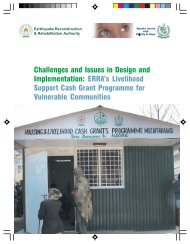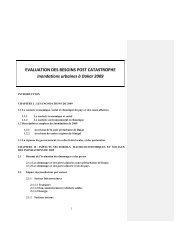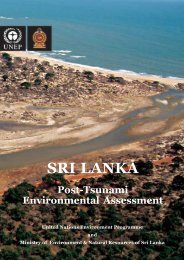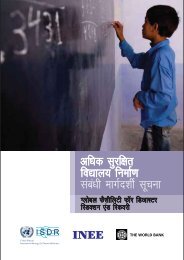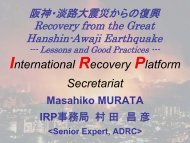The Maldives
The Maldives
The Maldives
You also want an ePaper? Increase the reach of your titles
YUMPU automatically turns print PDFs into web optimized ePapers that Google loves.
Dealing with Trauma<br />
<strong>The</strong> one major post-tsunami health issue that has arisen, affecting both<br />
adults and children, is psychological trauma. Initially, the most common<br />
psychological effects included intense fear of another tsunami, anxiety<br />
and depression, inability to sleep, loss of appetite, fear of the ocean,<br />
and an inability to concentrate. In addition, many people continue to<br />
experience distress from congested living conditions and lack of available<br />
information regarding their future. Tensions have arisen between host and<br />
IDP communities for a variety of reasons, and this has added to the stress<br />
experienced by these communities.<br />
Prior to the tsunami, the <strong>Maldives</strong> was considered to be well on the way<br />
to achieving the eight Millennium Development Goals (MDGs) 3 set out<br />
by the United Nations and ensuring that the economic prosperity of the<br />
past three decades was matched by an equally impressive improvement<br />
in human development indicators. <strong>The</strong>re were serious concerns that the<br />
damage caused to schools and health centres across the country and a<br />
significant IDP population would have a negative impact on key social<br />
indicators and the ability of the <strong>Maldives</strong> to achieve the MDGs. However,<br />
with the exception of certain pockets of poverty and a long-standing<br />
problem with child malnutrition, it appears that the <strong>Maldives</strong> will be able<br />
to meet the targets and goals laid out in the Millennium Declaration.<br />
From the onset, the Ministries of Health, Education, and Gender and<br />
Family together with the Red Cross Red Cresent Movement and their<br />
partners in the UN system—UNICEF, United Nations Population Fund<br />
(UNFPA), and the World Health Organisation (WHO)—approached the<br />
tsunami as an opportunity to make a sustained and meaningful investment<br />
in quality services in the key social sectors. In fact, the health and<br />
education requirements outlined in the NRRP were over-funded, which<br />
provided a unique opportunity to make significant investment for the<br />
long term.<br />
Health<br />
Although physical injuries were relatively few, the tsunami did inflict<br />
considerable damage on health infrastructure. One regional hospital,<br />
two atoll hospitals, 19 health centres, and 21 health posts were damaged<br />
or destroyed. <strong>The</strong>re was also a massive loss of medical equipment,<br />
consumables, and other hospital materials. All in all, the capital loss to<br />
the health sector is estimated at around US$ 12 million. Despite these<br />
losses, rapid replacement of lost equipment and supplies, supported<br />
by UNICEF, and immediate resumption of vaccination rounds kept<br />
immunisation coverage rates high, and the <strong>Maldives</strong> was spared any major<br />
disease outbreak following the tsunami. German Red Cross are supporting<br />
the Government in repairing health facilities and providing medical<br />
equipment and supplies at the cost of US$ 7.5 million.<br />
Capacity building, both for institutions and human resources, has been<br />
a key issue for WHO and other agencies in their collaboration with the<br />
Ministry of Health. Focus areas have included reproductive health, mental<br />
health, health care waste management, medical supply systems, laboratory<br />
services, health promotion, child growth monitoring, emergency<br />
preparedness, and communicable disease epidemiology and surveillance.<br />
Human resources have been developed through national training<br />
programmes and workshops and by sending health staff for training<br />
within South-East Asia.<br />
A number of initiatives have been taken to tackle the nation’s various<br />
psychosocial issues. In the immediate aftermath of the Tsunami a unit<br />
called the ‘Social Support and Counselling Services’ was created within the<br />
NDMC with counsellors and volunteers who coordinated psychosocial<br />
support activities in the affected islands. Work focussed on two major<br />
areas. First, sending counsellors to the worst affected islands to provide<br />
direct psychosocial intervention, and carry out workshops to generate local<br />
community volunteers for continuation of psychosocial support activities<br />
(known as ‘emotional support brigades’). <strong>The</strong> second arm was training<br />
teachers in schools all over the country to provide psychosocial support<br />
to pupils. <strong>The</strong> American Red Cross (AmRC) provided Psychological First<br />
Aid training and materials to 70 counsellors involved in the psychosocial<br />
intervention work. Through this programme, 22,500 people have been<br />
provided with social support and counselling services. Training has also<br />
been provided to 321 teachers in 20 atolls covering 226 schools and 6<br />
master trainers in Malé. UNFPA and UNICEF provided logistical support<br />
to these projects.<br />
<strong>The</strong> Ministry of Health has been working closely with WHO and UNFPA<br />
to increase the capacity of island health workers and communities to deal<br />
with these issues. On five atolls, health care providers have been trained<br />
in psychosocial and mental health issues; and local ‘community educators’<br />
have been given the skills to provide support to these communities as well.<br />
<strong>The</strong> Ministry of Gender and Family is establishing safe-play areas as a<br />
psychosocial support intervention for children on tsunami-affected islands.<br />
A programme by Care Society—one of the largest national NGOs—will<br />
be run with the involvement of members of tsunami—affected households<br />
will soon be providing psychosocial care to affected communities in four<br />
atolls. <strong>The</strong> AmRC will be implementing a three-year psychosocial support<br />
programme in six atolls, and capacity building at national level. UNFPA<br />
has briefed health care providers at the Indira Ghandi Memorial Hospital<br />
on the early identification and management of psychosocial issues. Senior<br />
government staff, the media, NGOs, and donor agencies have all been<br />
provided with training on IDP issues. With a need for reliable baseline<br />
data, UNFPA was instrumental in ensuring a module on reproductive<br />
health and psychosocial issues is included in the Tsunami Impact<br />
Assessment Survey currently being conducted by the Government.<br />
3 <strong>The</strong> United Nations Millennium Declaration sets out eight goals which signatory countries<br />
are required to meet by 2015. <strong>The</strong>se goals are: (1) eradication of extreme poverty and hunger;<br />
(2) universal primary education; (3) promotion of gender equality and empowerment of<br />
women; (4) reduction of child mortality; (5) improved maternal health; (6) combating of<br />
HIV/AIDS, malaria and other diseases; (7) environmental sustainability; and (8) develop<br />
a global partnership for development.<br />
THE MALDIVES ONE YEAR AFTER THE TSUNAMI | 21


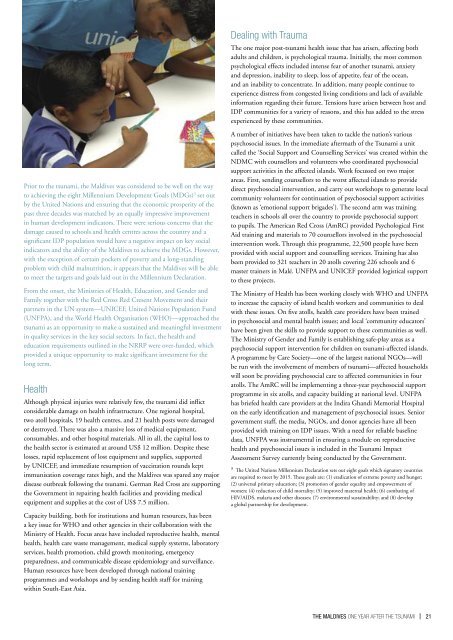

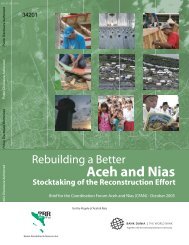
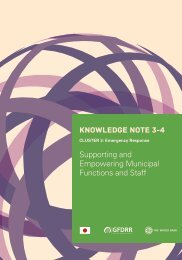
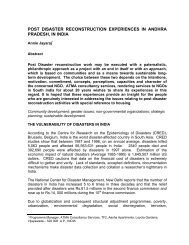
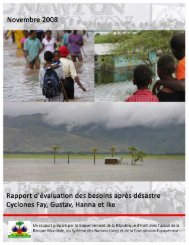
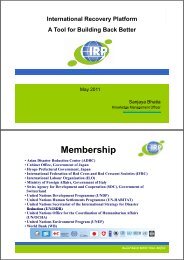
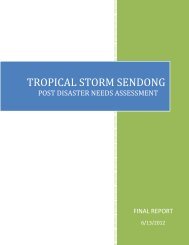
![View full document [PDF 7.65 MB] - unisdr](https://img.yumpu.com/48902806/1/178x260/view-full-document-pdf-765-mb-unisdr.jpg?quality=85)
